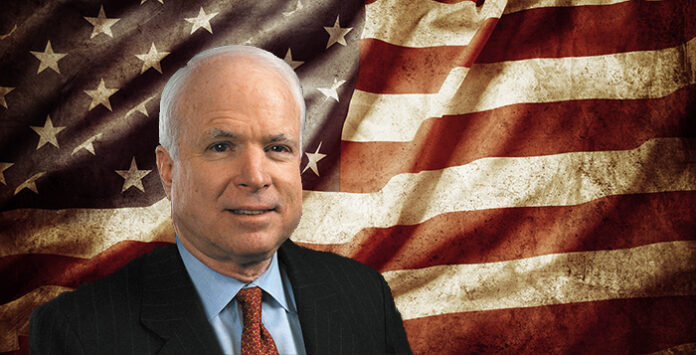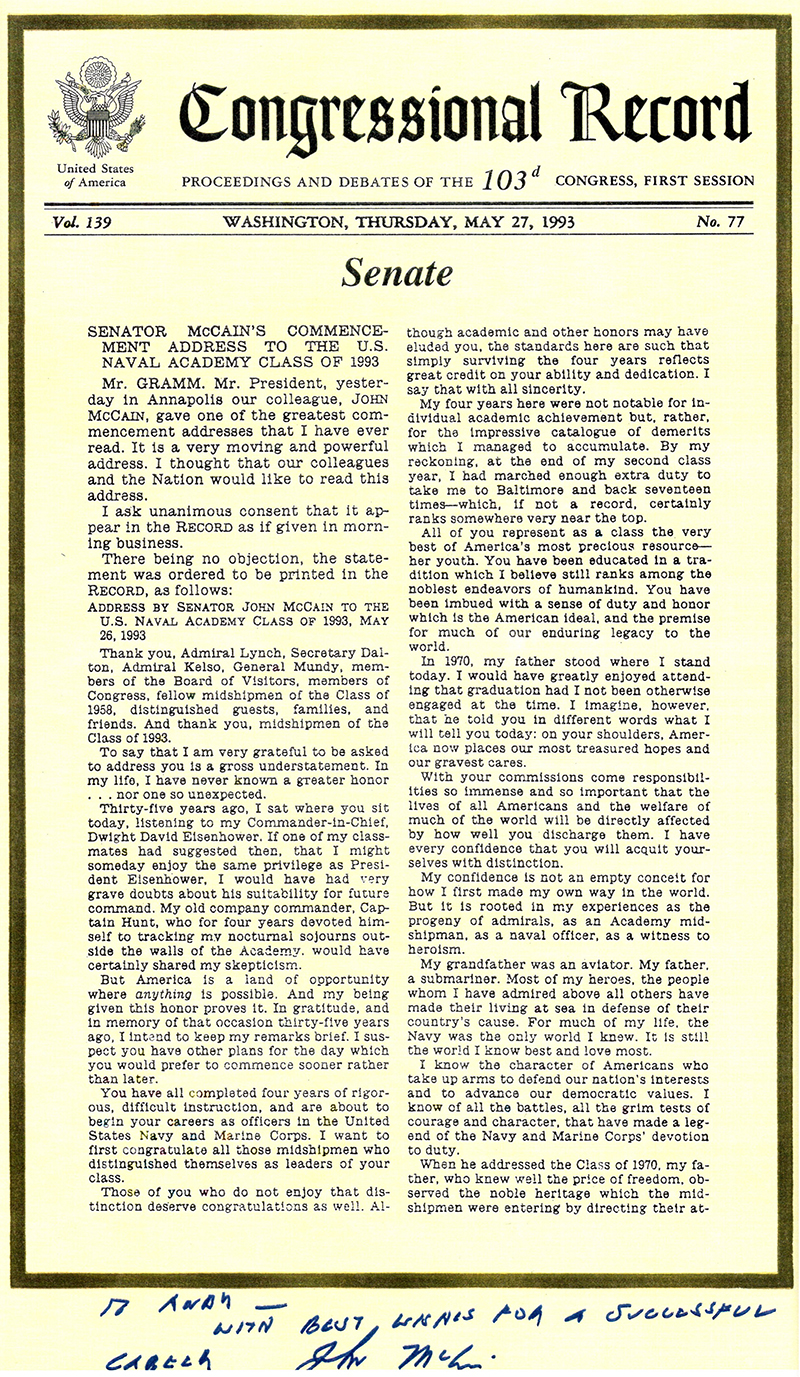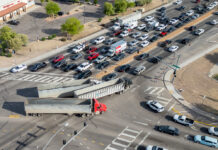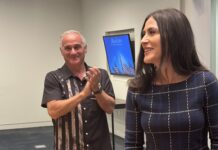
Sen. John McCain impacted countless Arizonans. The Bartles are among them.

Sen. McCain offered my brother an appointment to the United States Naval Academy and, as my dad says, “dramatically changed the course of our family’s life.”
Coincidentally, Sen. McCain finished what he started when he delivered the commencement address for my brother’s graduating class in 1993. His speech in many ways paralleled the man – witty, humble, patriotic, prophetic, selfless and timeless.
And it’s worth a read.
Thank you, Admiral Lynch, Secretary-Designate Dalton, Admiral Kelso, General Mundy, members of the Board of Visitors, members of Congress, fellow midshipmen of the Class of 1958, distinguished guests, families and friends. And thank you, midshipmen of the Class of 1993.
To say that I am very grateful to be asked to address you is a gross understatement. In my life, I have never known a greater honor . . . nor one so unexpected.
Thirty-five years ago, I sat where you sit today, listening to my Commander-in-Chief, Dwight David Eisenhower. If one of my classmates had suggested then, that I might someday enjoy the same privilege as President Eisenhower, I would have had very grave doubts about his suitability for future command. My old company commander, Captain Hunt, who for four years devoted himself to tracking my nocturnal sojourns outside the walls of the Academy, would have certainly shared my skepticism.
But America is a land of opportunity where anything is possible. And my being given this honor proves it. In gratitude, and in memory of that occasion thirty-five years ago, I intend to keep my remarks brief. I suspect you have other plans for the day which you would prefer to commence sooner rather than later.
You have all completed four years of rigorous, difficult instruction, and are about to begin your careers as officers in the United States Navy and Marine Corps. I want to first congratulate all those midshipmen who distinguished themselves as leaders of your class.
Those of you who do not enjoy that distinction deserve congratulations as well. Although academic and other honors may have eluded you, the standards here are such that simply surviving the four years reflects great credit on your ability and dedication. I say that with all sincerity.
My four years here were not notable for individual academic achievement but, rather, for the impressive catalogue of demerits which I managed to accumulate. By my reckoning, at the end of my second class year, I had marched enough extra duty to take me to Baltimore and back seventeen times – which, if not a record, certainly ranks somewhere very near the top.
All of you represent as a class the very best of America’s most precious resource – her youth. You have been educated in a tradition which I believe still ranks among the noblest endeavors of humankind. You have been imbued with a sense of duty and honor which is the American ideal, and the premise for much of our enduring legacy to the world.
In 1970, my father stood where I stand today. I would have greatly enjoyed attending that graduation had I not been otherwise engaged at the time. I imagine, however, that he told you in different words what I will tell you today: On your shoulders, America now places our most treasured hopes and our gravest cares.
With your commissions come responsibilities so immense and so important that the lives of all Americans and the welfare of much of the world will be directly affected by how well you discharge them. I have every confidence that you will acquit yourselves with distinction.
My confidence is not an empty conceit for how I first made my own way in the world. But it is rooted in my experiences as the progeny of admirals, as an Academy midshipman, as a naval officer, as a witness to heroism.
My grandfather was an aviator. My father, a submariner. Most of my heroes, the people whom I have admired above all others have made their living at sea in defense of their country’s cause. For much of my life, the Navy was the only world I knew. It is still the world I know best and love most.
I know the character of Americans who take up arms to defend our nation’s interests and to advance our democratic values. I know of all the battles, all the grim tests of courage and character, that have made a legend of the Navy and Marine Corps’ devotion to duty.
When he addressed the Class of 1970, my father, who knew well the price of freedom, observed the noble heritage which the midshipmen were entering by directing their attention to the sacrifices borne by their predecessors.
“The historic battles in which they fought are recorded on both sides of this beautiful stadium,” he said.
“Their names are memorialized on plaques on the back of seats now occupied by your families and friends. These officers were imbued with a sense of loyalty and dedication which scorns vacillation and doubt.”
I know that the character of which my father spoke is formed from many experiences. But I know also that you here today have been inducted into a tradition where you are expected to hold to the highest standards of honor in every aspect of your life. That is your advantage over other men and women. And that is why your country expects so much of you.
You have been taught much of what is necessary to lead other men and women in war and peace. You will learn much more from your approaching experiences. As ensigns and second lieutenants, the character of the young sailors and marines entrusted to your care will be formed in large part by their appreciation of your character.
You are where leadership begins. You are the models who stand just past the sergeants and chiefs, and those under your command will derive from your behavior the direction of their own lives. Their firm respect for you, on which their lives and our security will depend, will be determined by how faithfully you keep, on duty and off, the code you learned here.
This responsibility is yours for every waking minute of every day that you wear an officer’s uniform. When you forget your duty, others will suffer, but you will be called to account. If you dishonor yourself, you will dishonor your service.
In other walks of life, human failings may pass unnoticed. In our walk of life, their consequences are almost always devastating.
They may lead to the breakdown of good order and discipline because you disillusioned those who were inclined to follow your example. They may lead to the death of fine young men and women who were obliged to put their faith in your leadership. They may even threaten the trust of the people you are sworn to defend, and undermine the exquisite relationship between civilians and the military in a democratic society.
Such was the case in the recent Tailhook scandal. Such is also the case when we forget, even momentarily, our requirement to respect and obey our civilian commanders. When the American people elect a leader to govern the affairs of our great nation, our respect for their authority must remain inviolate. For it is that respect from which our profession derives so much of its nobility in a democracy.
Your commanders and instructors have worked hard to impart these lessons to you. Your constant remembrance of them will sustain you through long months at sea, long separations from family and friends; through the terror of combat, through grave injury, cruel imprisonment and even, if so required, unto death.
You know as well as I, that the world in which you take your commissions is an uncertain one. I have always tried to follow the advice of that venerable philosopher Yogi Berra, who said “never make predictions, especially when you’re talking about the future.”
But there are a few things I can venture an opinion on with some degree of confidence. With the collapse of the Soviet Union and Warsaw Pact, we have overcome a single massive threat to our security — a massive threat, but a reasonably predictable one.
But the world remains a dangerous place. And you will sail into a world where the threats to our security and our values are more numerous, more varied, more complex and, at times, much more obscure.
Yours is a world where power projection must become the essence of our national defense. The Navy and the Marine Corps will form the core of that strategy. The United States has exerted military force 240 times since the end of World War II. Eighty percent of those occasions involved the use of sea power. That percentage will almost certainly increase in the future.
We have seen the efficacy of U.S. military power in this new era displayed in Panama, in the Persian Gulf, and in Somalia. But we have also seen conflicts that reveal the limits of that efficacy, and for which we have few, if any, viable military answers. Such is the case in the horrible tragedy of Bosnia.
This will be a difficult world to stabilize, much less pacify. It will be difficult to anticipate the level and direction of threats. It will be difficult at times to distinguish friend from foe. It is a daunting challenge to protect our most vital interests in such a world. It will prove even more difficult to secure the success of liberty amidst the new uncertainties and recurring hostilities of our time.
But be assured, you will be called upon to do both. For we know how important our armed forces have been to advancing the just influence of our values. The Iron Curtain did not collapse by accident. The triumph of freedom in the world today is a direct consequence of the blood shed by those who have gone before you in battles too numerous to mention. Their sacrifices protected more than a narrow definition of our national interest. They served, in Lincoln’s words, as “a beacon light of liberty” to the most oppressed societies on earth.
One of the most compelling illustrations of the power of their sacrifice occurred four years ago in a Prague square, when a young Czech worker stood before a million of his countrymen, while two hundred thousand Russian troops occupied his country, and, trembling with emotion, read a manifesto that declared a new day for the peoples of Eastern Europe. But he began that new day with borrowed words when he proclaimed: “We hold these truths to be self-evident: that all men are created equal and endowed by their Creator with certain unalienable rights, among these life, liberty and the pursuit of happiness.”
Now, you are the shield behind which marches the enduring message of our own revolution. As I have said, it will be no easy task. But I trust in your willingness and your ability to undertake it.
I hold that trust in deference to my memories of this place, to the men who preceded me here, and to the men and women who followed me. We all shared with you that sense of duty and honor which, as my father said, scorns vacillation and doubt. Here we learned to dread dishonor above all other temptations.
Soon after I became an involuntary guest of the Democratic Republic of Vietnam, my hosts tried to persuade me to make a tape recording in which I would denounce my country’s cause. When I resisted, they entreated me to do so by promising me that no one would know of my disloyalty. I responded, “But I would know. I would know.”
Virtually all of my comrades who shared my situation responded in the same way.
There may be times in your life when the consequences of your devotion to duty are so dire that you will be tempted to abandon it. There may be times when truly only you will know. But you will resist. I know you will. I know this because I have seen how profoundly human strength is empowered by the standards of our tradition.
You see, I have spent time in the company of heroes. And I was raised on tales of surpassing courage and selfless devotion to duty. I have seen and heard of Americans who overcame extraordinary challenges on behalf of their country in struggles almost mythic in their dimensions.
I have seen aviators hurled off the decks of pitching ships, fly powerfully into grave harm, vastly beyond the bounds of normal human caution.
I know well the gunners’ stories of having choked back horror to face bravely the attacking kamikaze.
I have heard the tales of men, fathoms down, blind to the rest of the world, prowling the treacherous battlefields of the ocean depths in combat so terrifying it passes much of human understanding.
I stood on the deck of the carrier Forrestal, and watched the crew of that magnificent ship answer their summons to heroism, as one hundred and thirty-four of their number perished while fighting a fire that nearly consumed the ship. They fought all day and well into the next, with the tenacity usually reserved for hand-to-hand combat, and they saved the Forrestal.
I have seen the swift boats roar into harm’s way, vulnerable even to small arms fire, and defenseless save for the quick instincts and steel nerves of their crews.
As an adolescent, I heard men talk in whispered awe of a bleak, frozen terrain where the Marines of the First Division had struggled yard by yard, endured the sharp bite of Siberian winds to smash through seven enemy divisions. Their determined ferocity ranked their retreat from the frozen Chosin in the first order of honored American battles.
I have met the fierce warriors called SEALS, whose desperate fights occur beyond the reach of their nation’s artillery, and beyond the limit of human endurance.
I have watched men suffer the anguish of imprisonment, defy appalling human cruelty until further resistance is impossible, break for a moment, then recover inhuman strength to defy their enemies once more.
All these things and more, I have seen. And so will you.
I will go to my grave in gratitude to my Creator for allowing me to stand witness to such courage and honor. And so will you.
My time is slipping by. Yours is fast approaching. You will know where your duty lies. You will know.
God bless you. Semper Fi. Fair winds and following seas.


![MHS G.O.A.T. a ‘rookie sleeper’ in NFL draft Arizona Wildcats wide receiver Jacob Cowing speaks to the press after a practice Aug. 11, 2023. [Bryan Mordt]](https://www.inmaricopa.com/wp-content/uploads/2024/04/cowing-overlay-3-218x150.png)




![Maricopa’s ‘TikTok Rizz Party,’ explained One of several flyers for a "TikTok rizz party" is taped to a door in the Maricopa Business Center along Honeycutt Road on April 23, 2024. [Monica D. Spencer]](https://www.inmaricopa.com/wp-content/uploads/2024/04/spencer-042324-tiktok-rizz-party-flyer-web-218x150.jpg)





![Alleged car thief released without charges Phoenix police stop a stolen vehicle on April 20, 2024. [Facebook]](https://www.inmaricopa.com/wp-content/uploads/2024/04/IMG_5040-218x150.jpg)

![MHS G.O.A.T. a ‘rookie sleeper’ in NFL draft Arizona Wildcats wide receiver Jacob Cowing speaks to the press after a practice Aug. 11, 2023. [Bryan Mordt]](https://www.inmaricopa.com/wp-content/uploads/2024/04/cowing-overlay-3-100x70.png)


